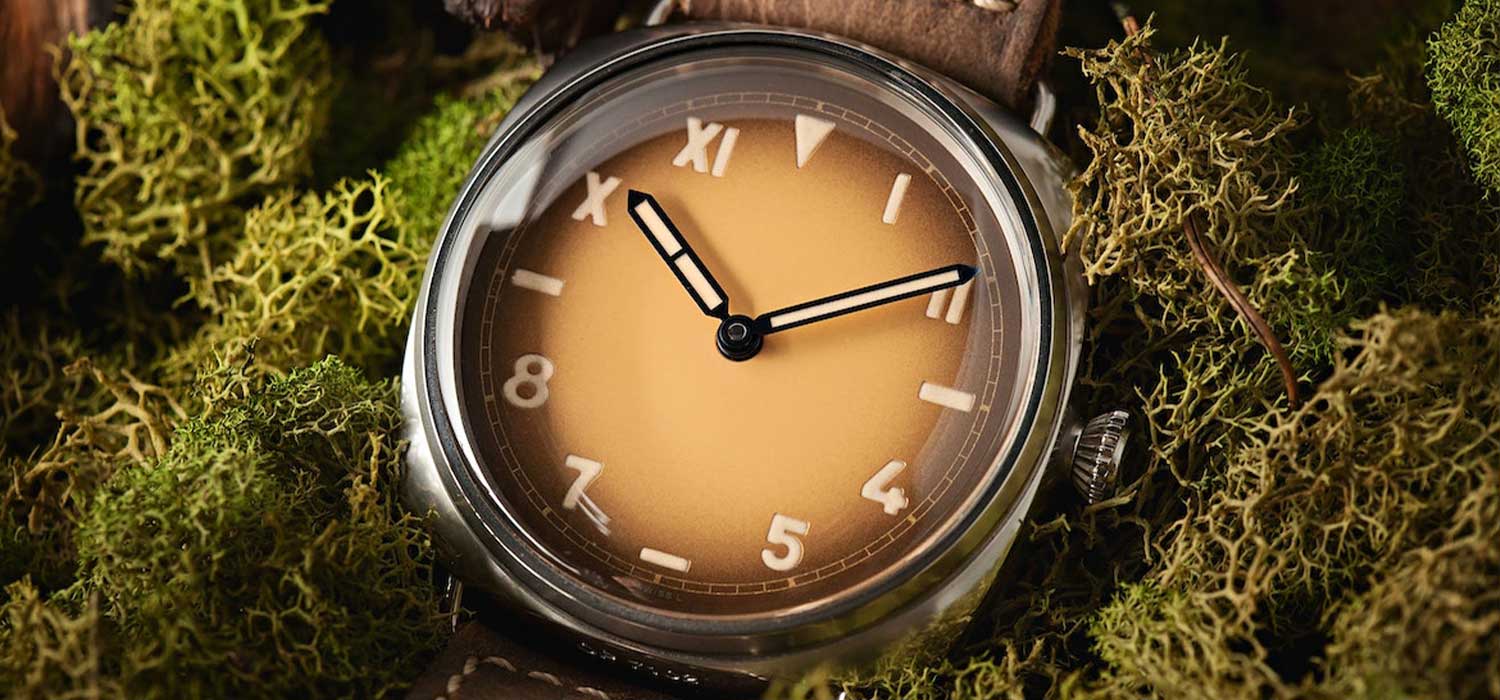Bob's Watches: Leading the Charge in Sustainable Luxury
Imagine a world where looking good doesn't cost the earth. In today's society, where we're more connected and informed than ever, we've all started thinking twice about where our products come from and what they stand for. Luxury, traditionally all about the glitz and glam, is getting a fresh makeover. Now, it's not just about the brand or the shine; it's about making responsible choices that feel right. So, here's the cool part: you can sport a stunning Rolex or purchase a classic Cartier watch and also be a hero for our planet. How? By diving into the pre-owned luxury watch market. These aren't just timepieces; they're statements. And as we explore this fascinating intersection of style and sustainability, you'll see it's not just about telling time, but also about shaping the times we live in. Ready to get started?
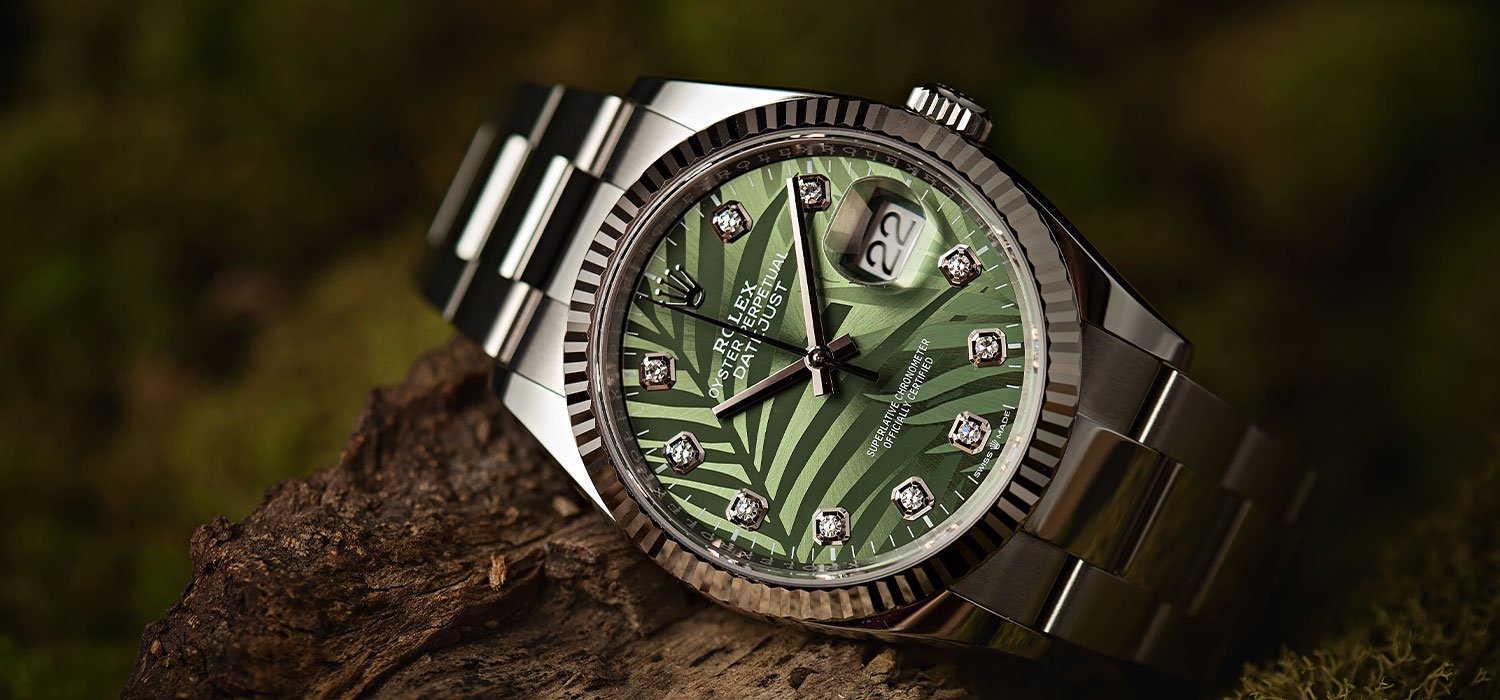
The Environmental Impact of Watch Production
Luxury watches, synonymous with elegance and precision, have long held a coveted position in the world of fashion and prestige. But behind the intricate craftsmanship and dazzling exteriors lies a detailed and resource-intensive production process. Every collection of Rolex watches for sale, Cartier, or any luxury watch is the culmination of raw materials that are mined, transported, and then meticulously molded into the masterpieces we wear.
Consider the metals and gemstones that adorn these timepieces. Their extraction often involves significant ecological disruption, from land degradation to water consumption. Then there's the manufacturing process, like the manufacturing process Rolex uses, but despite its precision, consumes vast amounts of energy. Additionally, the global nature of luxury watch production means components travel across continents, adding transportation emissions to the mix.
It's crucial to appreciate the artistry and engineering marvel that goes into each watch. Yet, as informed consumers, it's equally important to be aware of the environmental footprint of our choices. This isn't about casting a shadow over luxury brands, but rather understanding the broader picture. After all, making informed decisions requires a holistic view, weighing both the allure of luxury and its environmental implications.
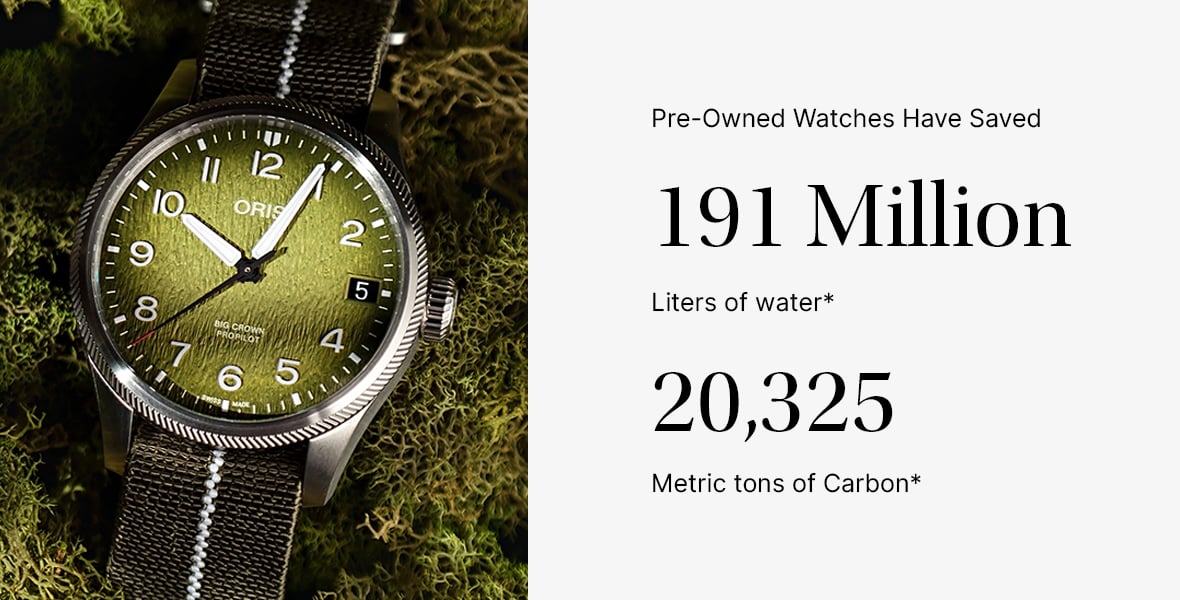 *As of March 31, 2023
*As of March 31, 2023
The Rise of Conscious Consumerism
In today's interconnected world, the consumer landscape is undergoing a significant shift. Gone are the days when brand name and aesthetic appeal were the sole purchase drivers. Instead, a new wave of conscious consumers is emerging, placing a spotlight on sustainability, ethics, and transparency.
As information becomes increasingly accessible, people are more aware of the broader impacts of their purchases. This awareness extends far beyond the price tag or the immediate utility of a product. Consumers are now asking questions like, "Where did this come from?" "Who made it?" and "At what environmental or social cost?" These inquiries signify a profound change in the buyer mindset, reflecting a desire to align purchases with personal values.
For the luxury industry, especially watchmakers, this change poses both challenges and opportunities. Brands that have traditionally leaned on their legacy and craft are now being prompted to also showcase their commitment to sustainability. The spotlight isn't just on the final product but on the entire journey, from sourcing materials to the workshop's energy consumption.
The rise of conscious consumerism isn't a fleeting trend. It's a powerful movement, pushing industries towards greater transparency and responsibility, ensuring that luxury and ethics coexist harmoniously. The rise of conscious consumerism isn't a fleeting trend. It's a powerful movement, pushing industries towards greater transparency and responsibility, ensuring that luxury and ethics coexist harmoniously.
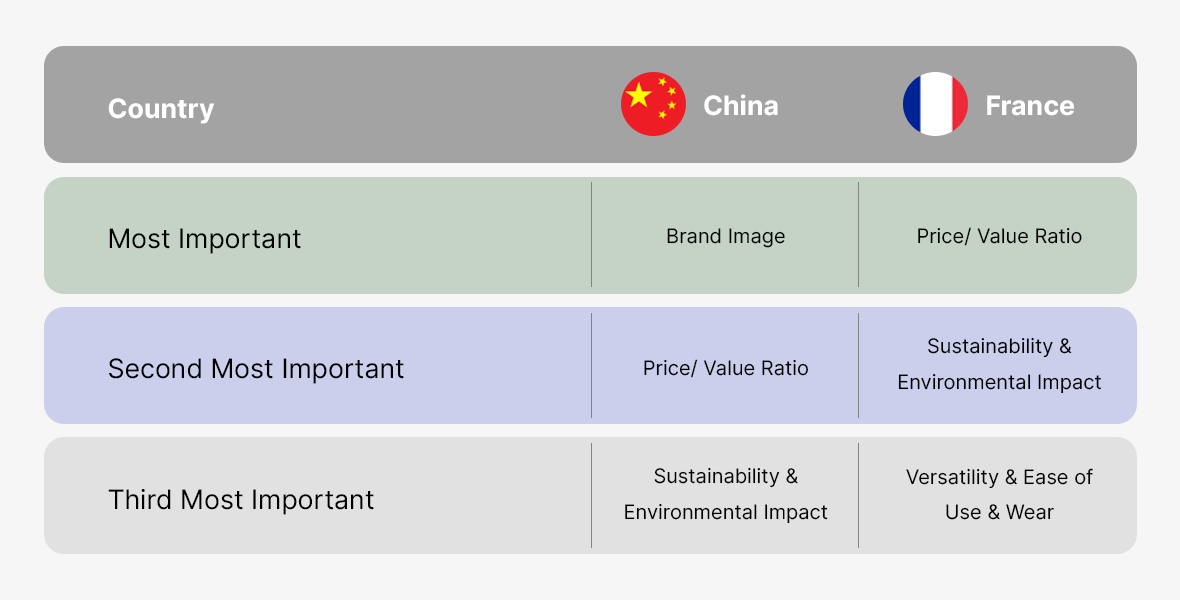 Source Credit: Deloitte Research
Source Credit: Deloitte Research
Recent research indicates that sustainability is becoming more important than brand image for many watch buyers. When given a choice between two similar watches, 32% said they would prefer the brand focused on sustainability over the one focused just on image. This reveals a shift in preferences, especially among younger consumers, who increasingly factor environmental impact into purchase decisions.
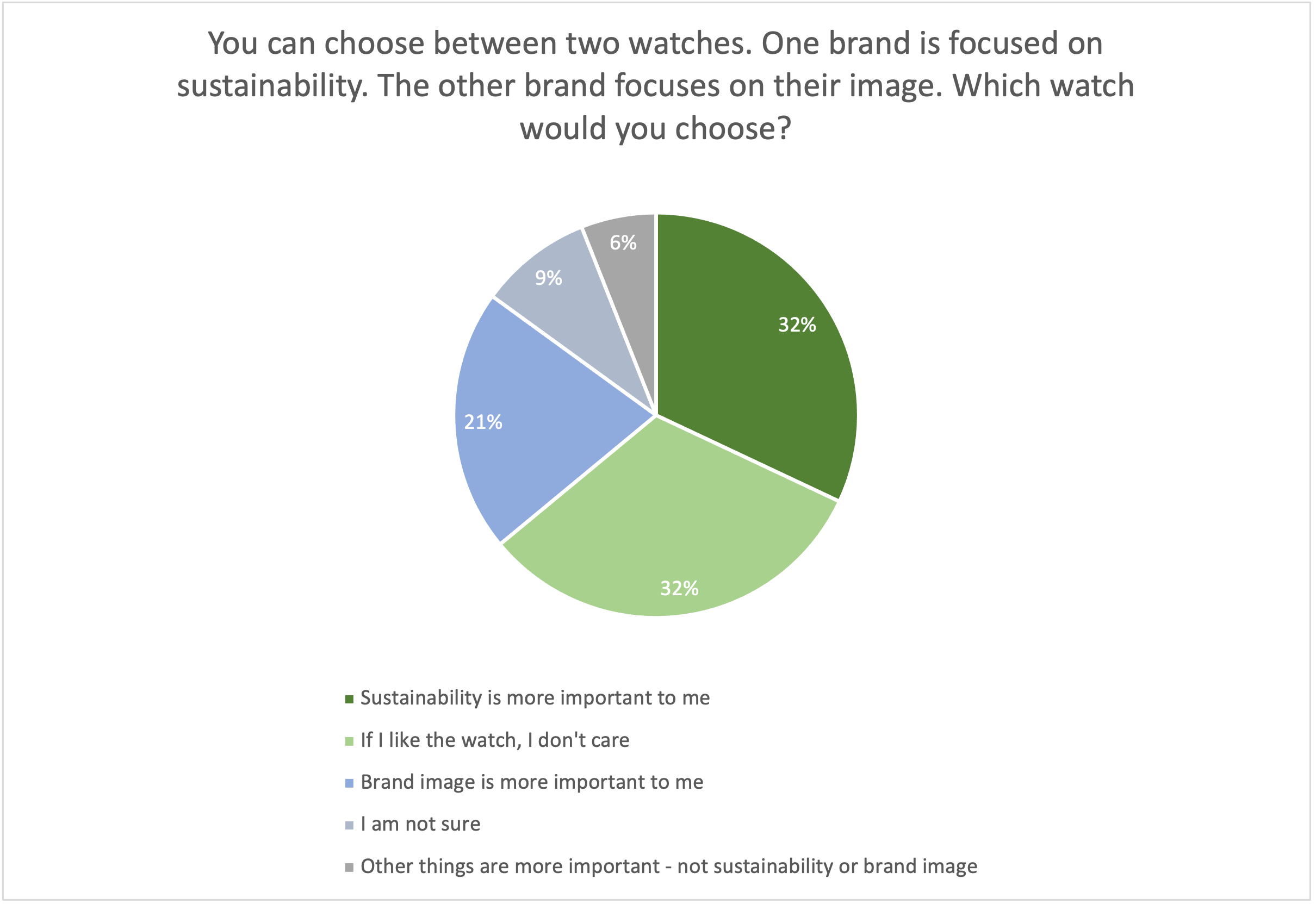 Source Credit: Deloitte Research
Source Credit: Deloitte Research
For watch brands, reducing their carbon footprint is now a top reason to invest in sustainability. A 2022 industry survey found that 77% of Swiss watch companies are prioritizing sustainability to lower their environmental impact. With climate change a pressing concern worldwide, consumers expect businesses to be proactive about reducing emissions across their operations and supply chains. Brand image remains relevant, but for a growing segment, sustainability matters more.
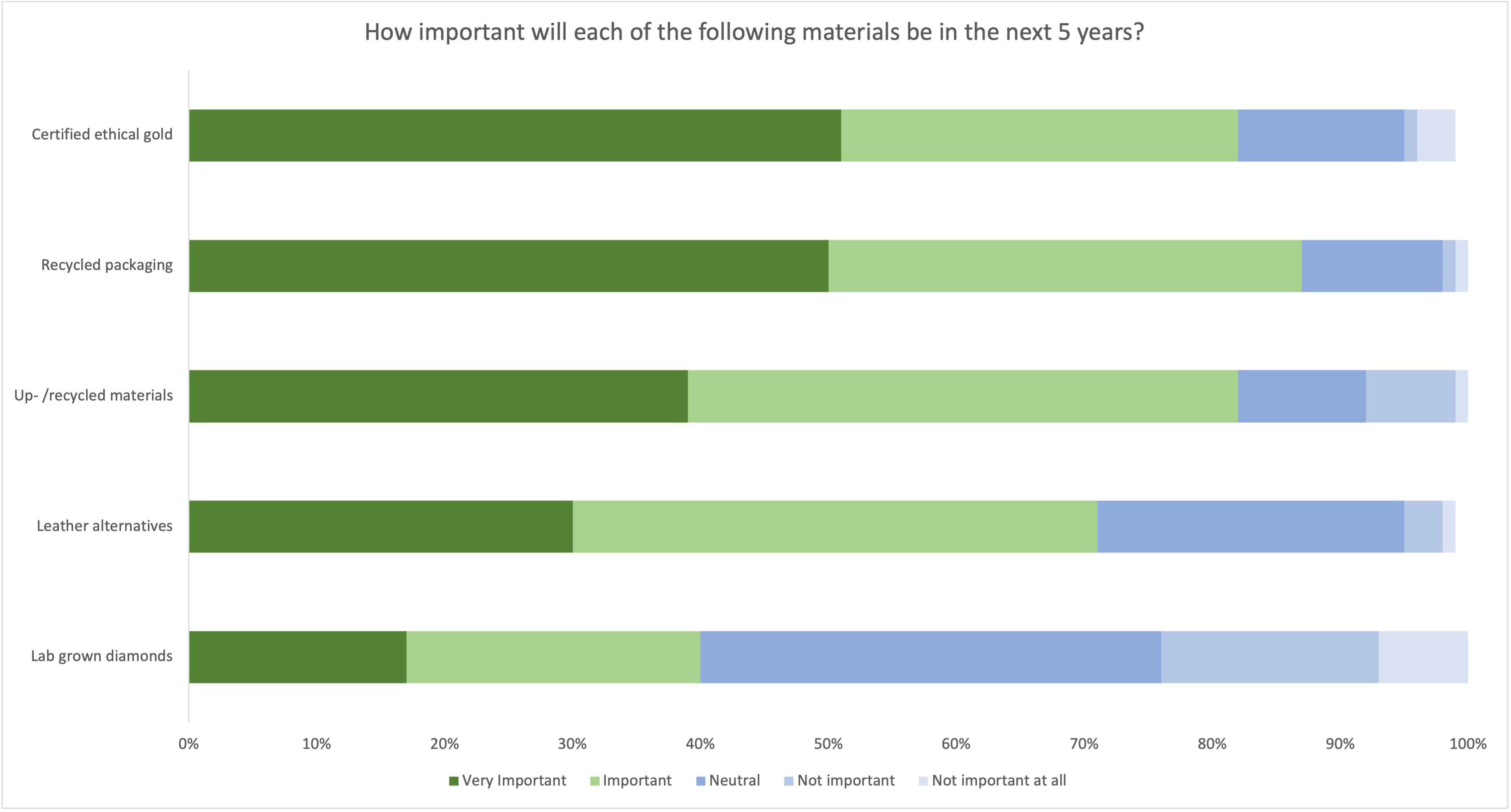 Source Credit: Deloitte Research
Source Credit: Deloitte Research
The Sustainable Charm of Pre-Owned Luxury Watches
Delving into the world of luxury watches, one quickly discovers a realm where artistry, history, and technology converge. But there's another dimension that's gaining prominence: sustainability. Pre-owned luxury watches emerge as a testament to this evolving narrative.
When you purchase a pre-owned Cartier or your favorite Rolex watches, you're not merely acquiring a timepiece. You're embracing a sustainable choice that resonates with environmental consciousness. Each pre-owned watch represents a reduction in the demand for new resources, signifying fewer mining operations, lesser energy consumption, and diminished waste.
While the second-hand market cannot address all of the sustainability concerns within watch industry, offering pre-owned pieces for a cheaper price can bring in additional customers who would not have normally purchased new watches. This does not diminish demand for newly manufactured items but instead increases accessibility to this particular sector.”Source Credit: Axies Digital
Beyond the environmental credentials, there's a unique allure to pre-owned watches. Each Luxury watch carries its history, a story etched in its dials and contours. The subtle signs of wear, far from diminishing its value, add character, revealing tales of past adventures and cherished moments. In essence, choosing a pre-owned luxury watch is like inheriting a legacy, a chronicle of timeless elegance that predates you.
As sustainability becomes a cornerstone of modern consumerism, the appeal of pre-owned luxury watches grows. It's where eco-responsibility meets elegance, offering watch enthusiasts a chance to both make a statement and make a difference.
The second-hand hard luxury market — mainly watches and jewelry — is booming at an impressive rate of 8% annually, faster than the global luxury industry as a whole. Analysts anticipate that this pre-owned sector will continue its growth trajectory by 8 to 10%, reaching a staggering GBP 23.5 to 26 billion in sales come 2025; already up from 14 billion within 2019 alone.Source Credit: Axies Digital
Embracing Sustainable Luxury
In a market inundated with options, Bob's Watches has steadily carved a niche for itself, not just as a purveyor of exquisite timepieces but as a champion of sustainable luxury. Our journey isn't merely about commerce; it's an earnest commitment to a greener and more responsible future.
At the heart of our mission lies a profound respect for both craftsmanship and conservation. By focusing primarily on pre-owned watches, we aim to mitigate the environmental impacts associated with the production of new items. But our commitment doesn't stop there. We've undertaken rigorous steps to ensure that each watch we offer meets the highest standards of authenticity and quality, ensuring that every timepiece has the chance for a renewed lease on life.
Our clientele, discerning and eco-aware, recognize the dual appeal of our offerings. They appreciate the intricate beauty of a Rolex or Omega, while also valuing the positive environmental footprint of choosing pre-owned.
As we continue our journey, Bob's Watches remains steadfast in its dual goal: to provide customers with unparalleled luxury experiences and to promote sustainability in every facet of our operations. In doing so, we're redefining the essence of luxury for the modern era.
The Watch Industry Steps Up Its Sustainability Game
The Swiss watch industry is stepping up its sustainability commitments in response to changing consumer preferences and greater public awareness of environmental issues. Although the industry has traditionally been conservative and slow to evolve, brands are now investing more resources into ethical and eco-friendly practices.
Recent Deloitte research found that for 64% of industry executives, the ethical sourcing of materials and human rights is the most important sustainability issue. Consumers also care about these issues, ranking them as the top priority along with minimal, recycled packaging. Brands are responding; for instance, IWC uses 100% FSC certified natural rubber in its straps.
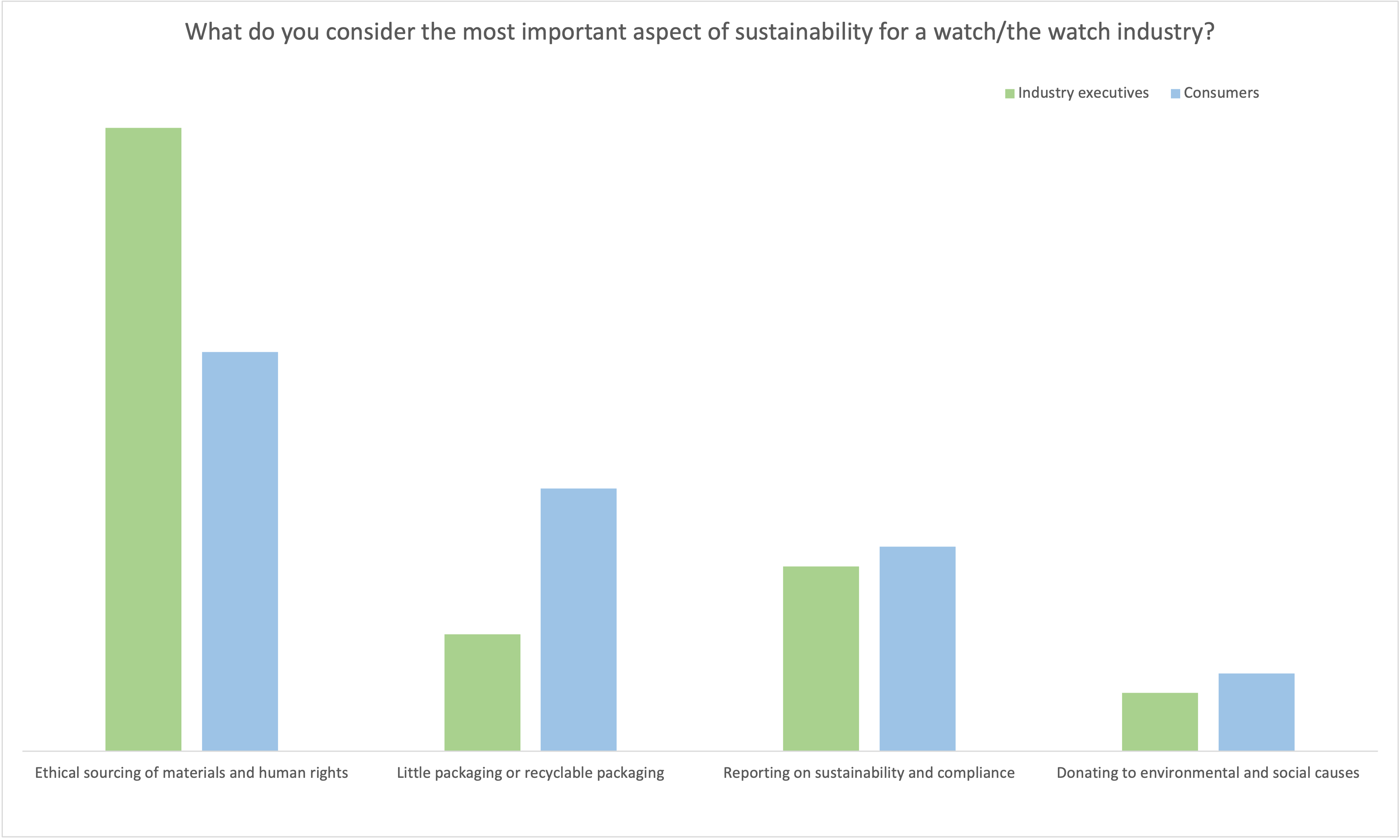 Source Credit: Deloitte Research
Source Credit: Deloitte Research
Watchmakers are also increasing their use of recycled and upcycled materials. Breitling makes straps out of discarded fishing nets, Panerai uses recycled steel in its cases, and ID Genève crafted a 100% recycled stainless steel watch with a strap from grape waste. These innovations reduce environmental impact and boost circularity.
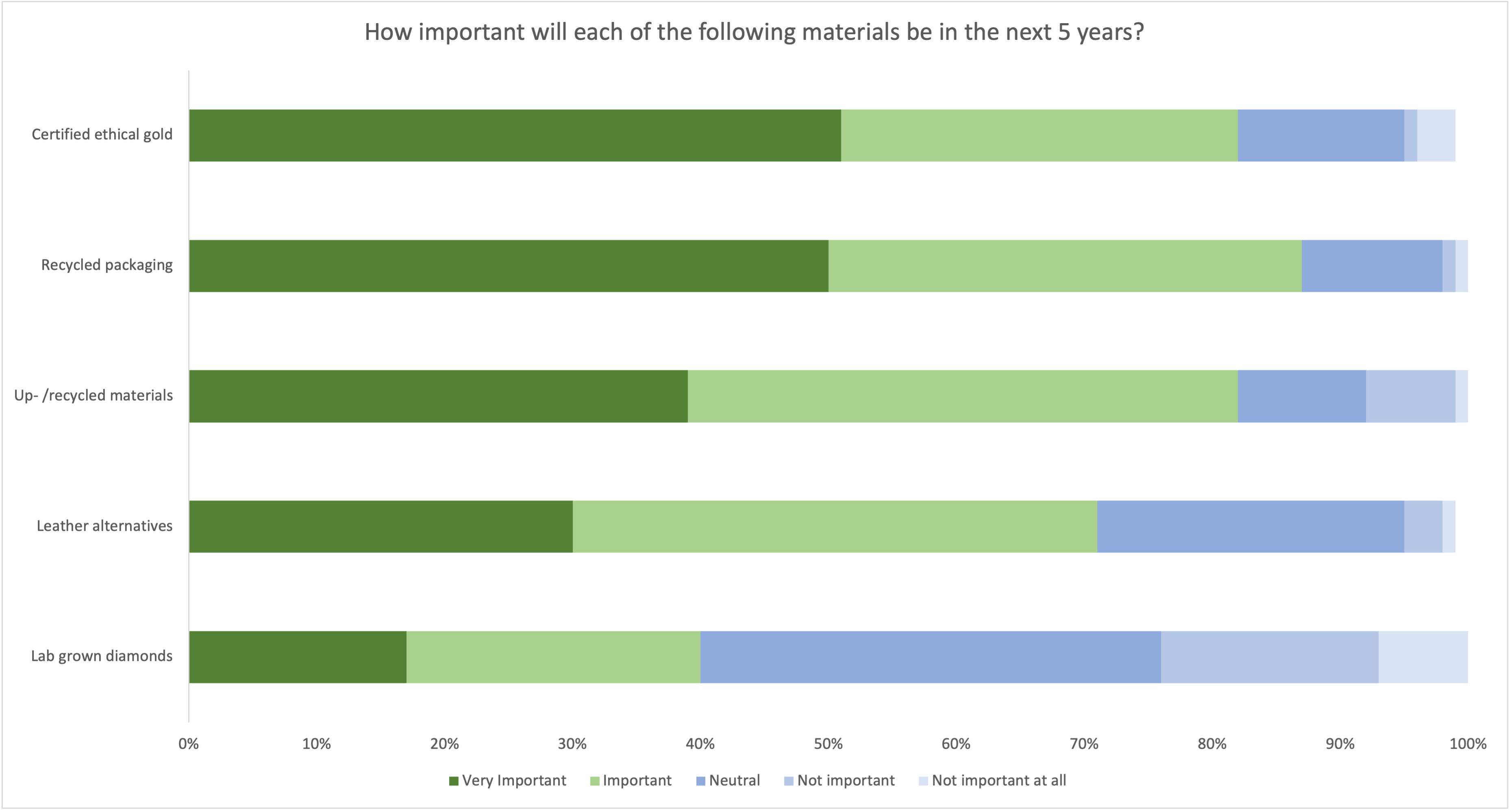 Source Credit: Deloitte Research
Source Credit: Deloitte Research
Transparency and reporting matter, too. Nearly half of watch brands publish sustainability reports and 70% see the pre-owned market positively as it extends product lifecycles. Ultimately, consumers and watchmakers both understand that luxury can co-exist with responsible choices. By making sustainability intrinsic to their mission, brands like Bob's Watches lead towards a more ethical future.
Benefits Beyond the Environment
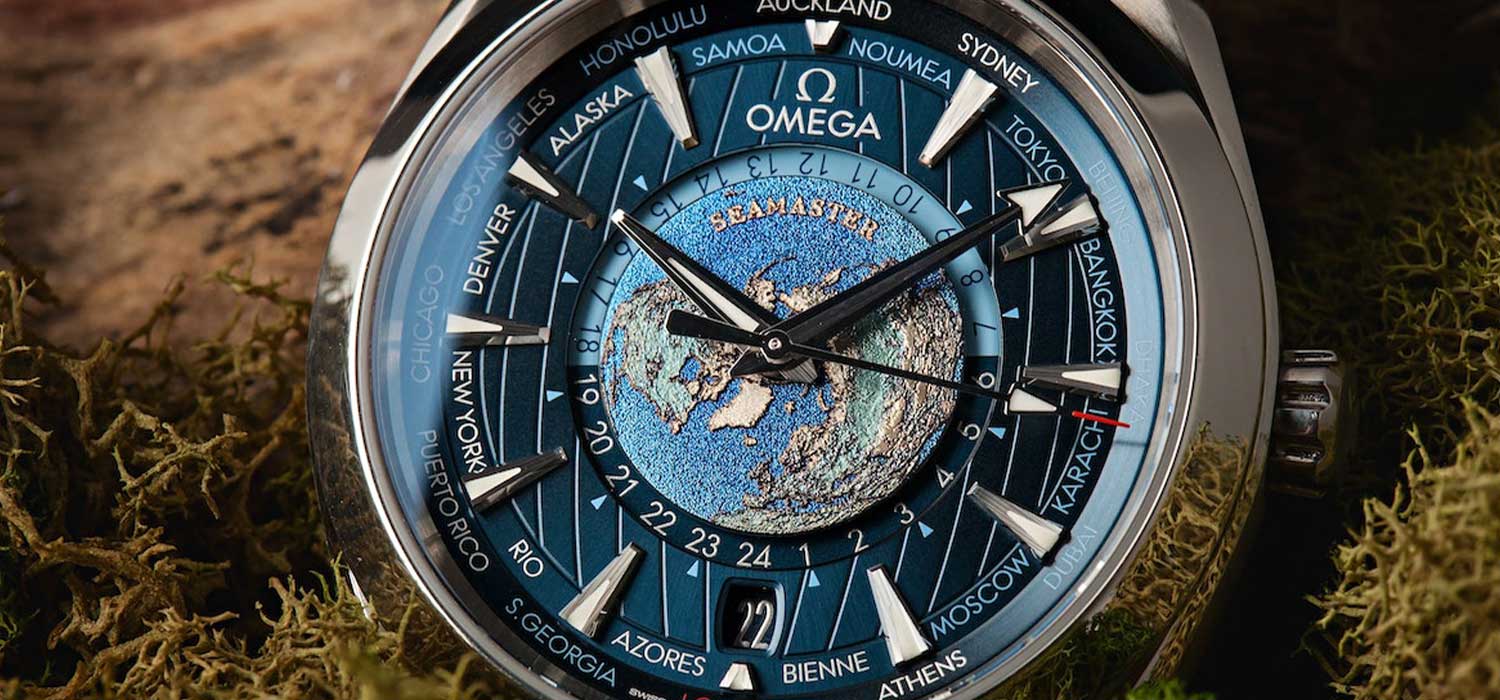
While the ecological advantages of pre-owned luxury watches are evident, the allure of these timepieces goes well beyond their environmental credentials. Embracing pre-owned is not just an eco-friendly decision; it's a nod to timeless elegance, historical significance, and exceptional value.
Firstly, there's the undeniable appeal of owning a piece of history. Each watch, with its intricate design and mechanism, has borne witness to moments, both monumental and mundane. Owning such a piece is like holding a fragment of the past, a tangible connection to stories and eras long gone.
Financially speaking, pre-owned watches often present unmatched value. While they retain the craftsmanship and allure of their brand-new counterparts, they often come at a more accessible price point (with some exceptions), offering aficionados the luxury experience without the hefty price tag.
Additionally, the world of pre-owned watches is vast and varied, presenting collectors with a plethora of unique and rare finds. This diversity ensures that enthusiasts have an ever-evolving treasure trove to explore, with pieces that might not be readily available in the mainstream market.
In essence, choosing pre-owned doesn't just benefit the planet; it enriches the personal experience of watch ownership in myriad ways.
Conclusion
Navigating the world of luxury watches, we're reminded that true luxury isn't just about prestige or aesthetics; it's about making choices that resonate with our values. Embracing pre-owned watches isn't merely an environmental gesture; it's a celebration of history, craftsmanship, and smart investment. At Bob's Watches, we're proud to be at the forefront of this sustainable journey, offering timepieces that are both eco-conscious and deeply personal. As we move forward, let's redefine luxury, making it not just about owning the best but also doing the best for our world and ourselves.
